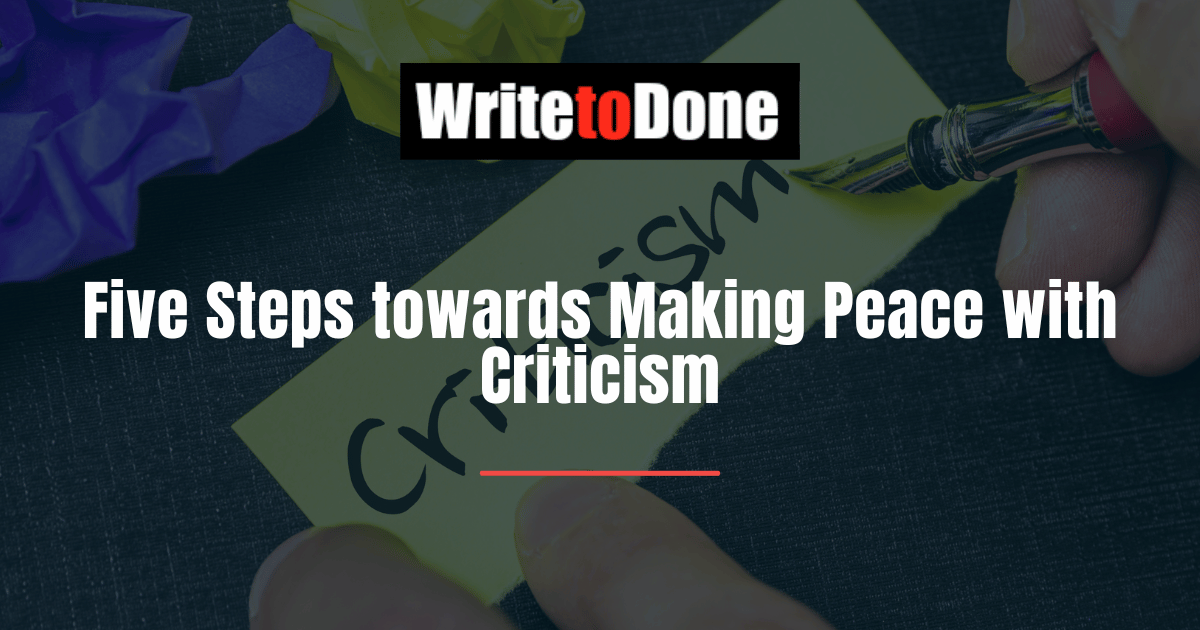“To avoid criticism say nothing, do nothing, be nothing.”
— Aristotle
When learning the craft of writing, criticism is vital. It encourages us to strive for higher standards.
And yet, despite this benefit, even constructive criticism can be distressing. It makes you see weaknesses in your work that you previously overlooked. Nobody enjoys seeing their failings in the cold light of day — you feel vulnerable.
When criticism is unreasonable, it can damage your confidence as a writer. You can start chasing shadows, looking for faults where there are none. You can forget the fun of writing.
It’s tempting to shoot the messenger. There are few writers who haven’t felt personally insulted after receiving criticism — some will have thrown all their toys out of their pram once or twice.
If you’ve received criticism and are not a Buddhist monk, you’ll know the feeling.
In this post I want to describe why people feel insulted by criticism and how you can develop a healthier attitude towards it.
Why Do People Feel Insulted by Criticism?
The simple answer is that writers confuse criticism of their work for criticism of themselves as a person. So to say that your writing is no good is to say that you’re no good period. This is blatantly hogwash.
Why does poor writing make you no good as a person? Because you’re attached to the idea of yourself as a writer. Your self-worth is contingent on your belief in that idea. To attack the idea is to attack you.
At the heart of the matter is a fear that you are inadequate. You’re scared that you’re not good enough.
Someone who isn’t attached to the idea of themselves as an accomplished writer, if presented with evidence that they’re not as good as they thought, will simply correct their opinion of themselves. The stronger your attachment to an idea that criticism threatens, the less palatable it will be.
How to Accept Criticism
The key to peacefully accepting criticism is hold more realistic beliefs about criticism, your writing, and yourself.
(1) Accept your fallability — You should accept that you, like any other writer, can learn more about your craft. You should approach writing like a beginner: be eager to learn and open to criticism. I suspect that the best writers will hold this attitude. Arrogance can halt your progress as a writer.
(2) Expect and welcome criticism — If anyone reads your writing, you should welcome criticism whether you ask for it or not. You should also expect that not all criticism will be constructive and useful.
(3) Consider the message not the messenger — You should solely focus on the point made. Everything else is irrelevant. How the criticism is phrased is irrelevant. “In one word: prolix. You utter dumbass.” could be a good criticism. The source of the criticism is also irrelevant.
(4) Think practically — You should concentrate on tangible lessons you can learn or steps you can take to improve your writing. This is your goal and you shouldn’t be distracted from it. It may be something general like proofreading your work more carefully, or it may be more specific like looking out for ambiguous sentences. Getting upset is pointless. As Sherlock Holmes notes, “Don’t snivel, Mrs. Hudson. It will do nothing to impede the flight of a bullet.”
(5) Only hold fast that which is good — If there is nothing you can learn or no changes your can make in response to a criticism, then dismiss it. Getting angry at the inept critic achieves nothing. Throwing a self-pity party also achieves nothing.
Conclusion
Everytime you notice a new imperfection in your writing, you become a better writer. If anything, it is a moment to be celebrated. Your ignorance isn’t bliss for your readers.
Remember the power words can have. Words have been responsible for great armies and empires. They can encapsulate the vast body of human knowledge. They can make people laugh one moment and then cry the next.
Criticism is a great way to improve your skills as a writer. Embrace it.
A guest post by Mark Milan who is a freelance writer from the UK. He blogs about freelancing and writing at http://markmilan.net/.
















